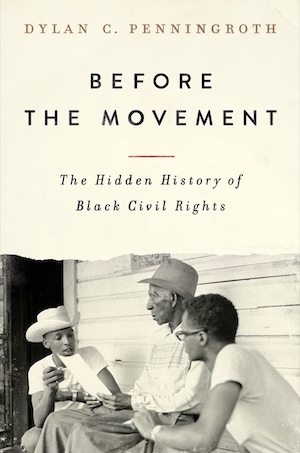By Fred H. Lawson
Shortlisted for ΦBK’s 2024 Ralph Waldo Emerson Award
In the classic tale of the struggle for freedom and civil rights for Black people in the United States, the law is portrayed as a tool of white oppression. Statutes enacted by state legislatures constrained Black people in onerous ways; activities that might now be considered instances of protest and resistance were treated as violations of the law and subjected to criminal punishment; regulations concerning personal status excluded Black people, whose marriages and inheritances were routinely dismissed by white authorities. It was not until earlier statutes were abolished and superseded by ones that included and respected Black people—most notably the Civil Rights Act of 1964—that the law at last started to work to their benefit.
Before the Movement sets out to demolish this long-held story and show how Black people “routinely” used the law to their own advantage, even when the prospects of doing so looked extremely grim. The analysis rests largely at the local level, where community practices and particularistic conditions trump the abstract principles and comprehensive applicability that inhere in the deliberations of legislators and rulings issued by judiciaries. Evidence uncovered through painstaking research in the dusty storage cabinets of county courthouses throughout the South brings to light a wide variety of bargains, claims, and protections that shaped the everyday lives of Black residents throughout the 19th century and governed their dealings not only with one another but also with privileged white citizens.
Enlightening as it is, this evidence remains anecdotal. Black people in the antebellum South evidently had the ability both to control land, in some places at some times, and to transfer that control to others in exchange for money. This came as a surprise to me and immediately raised two questions: whether these practices were more prevalent in some regions than they were in others and whether they exhibited any notable trend over time. Someone predisposed to local history might want to stake out a particular location (or two, for purposes of comparison) and explore the ways in which the law with respect to Black landholding operated during a manageable span of time. It may well be that the empirical material required to carry out such a research project has not survived. Alternatively, it would be worth knowing if any significant changes took place in the law with respect to Black landholding during the turbulent 1850s, which might have helped to precipitate the Civil War.
Disputes over contracts and inheritances kept Black people engaged with the law throughout Reconstruction. Their cases were often handled by white lawyers who had been slaveholders and officers in the Confederate army. Penningroth recounts one episode, in which the son of a former Confederate colonel represented a Black man charged with breaking into a local business and poses the pertinent question why he put so much effort into the defense. The lawyer appears to have “felt there wasn’t much ‘evidence against the negro’,” and may have signed on “because he was fresh out of law school and eager to shine.” On the other hand, he could well have been acting so as to burnish “his rebel bona fides: his client’s accuser was the disgraced Commissary-General of the Confederate Army, whose failure to fix the army’s supply-chain logistics made him a scapegoat of the Lost Cause.” The law makes strange bedfellows.
As Reconstruction waned, a great many statutes and regulations took hold that once again imposed severe restrictions on the lives of Black people throughout the South. Nevertheless, Penningroth reports that “the evidence from county courthouses suggests that Black people went to the trial courts during Jim Crow even more than during Reconstruction.” More than 90 percent of the cases involved Black people suing other Black people, so “Black people’s legal activity did not challenge white supremacy in any substantive way.” The courts consequently treated proceedings that involved Black people pretty much the same way that they did proceedings involving white people. A crucial difference was that almost all of the lawyers were white, and the ensuing professionalization of the legal profession drove out the few Black lawyers who had been in practice at the turn of the 20th century.
By the time that the Civil Rights Movement took shape after the Second World War, Black Americans had long and extensive experience with the law. Influential leaders like Thurgood Marshall led the charge to expand and solidify the formal citizenship rights of Black people; meanwhile, most Black lawyers plugged away at the quotidian work of litigating disputes over contracts, marriages, and inheritances, what Penningroth calls “the rights of everyday use,” hoping that their meagre compensation would cover next month’s rent. A good deal of this litigation seems to have embroiled predominantly Black churches and religious associations.
All of this experience became discombobulated during the 1960s. Civil rights law diverged sharply from the rights of everyday use. Contract and property law no longer concerned family farms and livestock, but instead dealt with apartment leases, “government entitlements, employee benefits, and even intellectual property.” As a result, “claiming resources like Social Security and fringe benefits pulled African Americans toward new areas of law and new legal institutions,” with which they were unacquainted. This momentous shift reinforced the notion—shared by civil rights activists and white supremacists alike—that Black people were woefully ignorant of the law and needed help to protect and advance their interests. Before the Movement reclaims the thoughtfulness, creativity, and tenacity that generations of Americans have been forced to exercise in wrestling with the law, as a potent means to circumvent the barriers they have persistently confronted.
Fred H. Lawson (ΦBK, Indiana University) is Professor of Government Emeritus of Northeastern University and Adjunct Professor of International Relations at Universitas Brawijaya, Indonesia.




